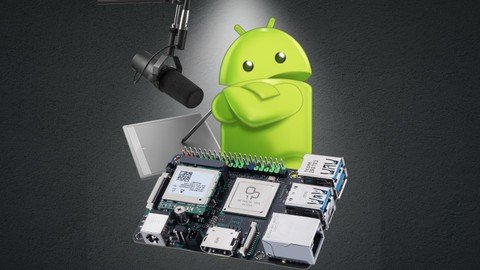
Published 5/2023
MP4 | Video: h264, 1280×720 | Audio: AAC, 44.1 KHz
Language: English | Size: 8.52 GB | Duration: 6h 58m
Explore Android Open Source Project and design powerful systems using Android 11
What you’ll learn
Understand embedded system essentials and purpose
Understand high level operating systems (Linux, Android) and purpose of using one
Understand Linux software stack essentials
Understand Android software stack essentials
Customize Android Open Source Project
Work with Android 11 source
Run Android 11 on ASUS Tinkerboard 2
Create custom Android builds for ASUS Tinkerboard 2
Create Android native services
Port native binaries to Android build system
Get around with Android build system (Soong, Makefile)
Use Android Debugging Bridge (ADB) confidently for talking with embedded devices
Use Fastboot confidently for flashing images
Create and work with SELinux policies
Work with AOSP directories confidently
Understand and work with partitions in Android
Port custom Android applications to AOSP
Run Google Compatibility Test Suite (CTS)
Design Android Software compatible with CTS
Get and set system features by manipulating Android system properties
Define and integrate AIDL interfaces
Understand Linux and Android boot process and their differences
Requirements
Basic Linux understanding (commands, bash scripts, code compilation, basic concepts)
Basic embedded system understanding (basic concepts, cross compilation, system images)
Basic C and C++ programming understanding (not a must but good to have)
Description
Hi,My name is Mustafa Ozcelikors, a Linux & Android Architect with more than +7 years of experience working in automotive, who have won Google SOC event in 2017. Here comes a unique beginner to intermediate course that is dedicated to teach Android Open Source Project and Embedded Android concepts to a larger audience.Visual Embedded Android Training is a unique course in the way that I use slideshows, pen and canvas for theoretical subjects, whereas makes hands-on examples for the practical subjects. I have mastered this technique over the years, teaching my colleagues at work, teaching on Youtube, and now I have decided to move on to Udemy to reach larger audience.Theoretical subjects are carefully planned and almost for every important subject, multiple block diagrams have been created for better understanding. Almost every figure, schematic, drawing comes from years of experience in the field, not from the internet or from any book. In practical subjects we take a deep dive in exploring AOSP directories and open up a terminal to achieve things within it.At the end of the course we together will have a custom Android with custom launcher and custom theme, with integrated AIDL service and test application.You are in this now for the following great content:Understand embedded Android and Linux software stacksGet around with Android 11 source code and Soong (Android.bp) build systemUse ASUS Tinkerboard 2 and run Android 11 on it , completely from the source.Create AIDL interfaces, native C++ Android services, create test applicationsPort existing Android Java applications to Soong (Android.bp build systemUnderstand AOSP folder layout, partitionsUnderstand and work with SELinux policiesFlash images confidently using fastboot toolTalk to embedded device confidently using adb toolRun CTS testsLog and dump Android system informationThank you!!Kindly yours,Mustafa
Overview
Section 1: Introduction to Embedded Systems
Lecture 1 Introduction to Embedded Systems
Lecture 2 A Generic View on an Embedded System
Section 2: Embedded Android Architecture
Lecture 3 Android vs Linux
Lecture 4 Linux Architecture Basics
Lecture 5 Android Architecture
Lecture 6 How Linux and Android Boots?
Section 3: Building Android Source and Flashing Android Image
Lecture 7 Obtaining and Building Android Source
Lecture 8 Downloading Android 11 source for ASUS Tinkerboard 2
Lecture 9 Building Android 11 source for ASUS Tinkerboard 2
Lecture 10 Flashing Android 11 image to ASUS Tinkerboard 2
Section 4: A Tour Through Android Source and Partitions
Lecture 11 Android Source Code Directories Explained
Lecture 12 Android Filesystem Partitions
Section 5: Accessing Android Device
Lecture 13 Introduction to ASUS Tinkerboard 2 Hardware and Interfacing using Serial
Lecture 14 Introduction to ADB and Fastboot
Lecture 15 Flashing seperate partitions using Fastboot tool
Lecture 16 ADB Remote Screen
Section 6: Exploring ASUS Tinkerboard 2 directories and sources
Lecture 17 Board, build, and device configuration files
Lecture 18 Init Scripts (RC files)
Lecture 19 Devicetree and Kernel Config Files
Lecture 20 Files for Android Framework Customization
Section 7: Customizing Android Framework
Lecture 21 Integrating a Custom Launcher in Android Build System
Lecture 22 Creating a New Device Workspace to Contain Our Changes
Lecture 23 Integrating a Prebuilt Application (Apk) in Android Build System
Lecture 24 Customizing Android Framework to Enable Night Mode
Lecture 25 Customizing Android Framework to Modify Default Wallpaper
Section 8: Working in Android Build System
Lecture 26 Android System Properties
Lecture 27 Integrating Plain C Applications in Android Build System
Lecture 28 Deploying Binaries to Various Partitions using Android Build System
Lecture 29 Taking a Partial Build using mm Command
Section 9: Understanding and Creating Native C++ Service
Lecture 30 Introduction to Native Service Creation in Android
Lecture 31 Creating Native AIDL Service using C++
Lecture 32 Creating Init Script for Our Example Service
Lecture 33 Modifying Manifest Files for adding AIDL Interface
Lecture 34 Creating Aidl Interface Library using Android Build System
Lecture 35 SELinux Configuration for Example Service
Lecture 36 Creating Test Application to Talk with Example Service over AIDL Interface
Section 10: Going Forward
Lecture 37 An Example Approach to Fixing System-wide Issues
Lecture 38 Testing and Certification in Android
Lecture 39 ADB Commands for System-wide Debugging
Beginners and enthusiasts who understand Linux and want to learn AOSP and Embedded Android,Hobbyists who want to work with ASUS Tinkerboard 2 and AOSP,Beginners who would like to develop their car infotainment, or mobile devices based on Android,Professionals who want a great wrap-up on their favourite subject
Password/解压密码www.tbtos.com
转载请注明:0daytown » Visual Embedded Android (Aosp) With Drawings And Practice